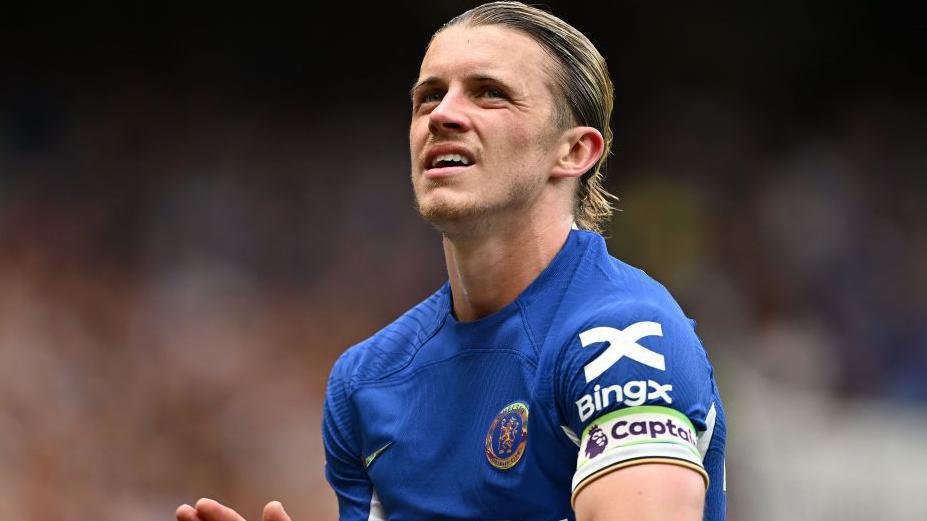How clubs kept to spending rules & what next?

Conor Gallagher was sold by Chelsea to Atletico Madrid this summer despite previously captaining the side and being an academy product
-
Published
This time last year we were talking profit and sustainability rules (PSR), points deductions and asterisks on Premier League relegation battles – as financial rule breaches and potential ramifications dominated the second half of the season.
Three clubs – Everton, Nottingham Forest and Leicester – were hit with charges, while Newcastle manager Eddie Howe said his club were “educated” by the scramble to avoid their own PSR charge.
With confirmation on Tuesday that no clubs will face similar charges this season, BBC Sport looks at how clubs have avoided falling foul of PSR, and which clubs might be at risk in the future.
-
-
Published5 hours ago
-
-
-
Published24 June 2024
-
-
-
Published6 June 2024
-
The ‘PSR deadline day’ that ‘worked like a dream’
As BBC sports editor Dan Roan wrote in June, a flurry of transfer deals between clubs with PSR challenges sparked speculation that certain teams were working in tandem to strike ‘swap’ deals that would improve their balance sheets by the 30 June 2024 accounting deadline.
When a club sells a player, any profit is recorded in its entirety in that year’s accounts – with homegrown academy players generating ‘pure’ profit.
No-one was breaking the rules but questions were raised over valuations, the use of young players and whether the loophole was a negative consequence of the PSR system. At least one club complained to the Premier League, sources told BBC Sport at the time.
Football finance expert Kieran Maguire told BBC Sport: “Clubs were treating young men as commodities to dig them out of the financial mess.
“It’s worked like a dream and it does show just how farcical the rules are.
“In a sense [the rules] are encouraging the sales of academy players that clubs are using as a get-out-of-jail-free card when it comes to cost compliance. It encourages short-termism.”
Maguire says the new spending cap rules which are due to start from 2025-26, after being trialled in the background for this season, will still see clubs “focusing on the exit door” on a “year-to-year basis”.
He said: “The ability to monetise fringe players, academy players and so on, will continue to be important”.
Aston Villa: ‘Grealish profits run out’
Nick Mashiter, BBC Sport football news reporter:
Villa needed to sell players last summer to comply, having reported a loss of £119m in their accounts up to 31 May 2023.
At the time Villa said the figures were “in line with the strategic business plan” and within PSR, set by the Premier League.
In the early summer scramble to be compliant before 30 June they sold midfielder Douglas Luiz to Juventus for £42m and Moussa Diaby joined Saudi side Al-Ittihad for £50m, while they also allowed Tim Iroegbunam to leave for Everton for £9m and Omari Kellyman to Chelsea for £19m.
Yet Diaby’s signing from Bayer Leverkusen for a reported £51m and Spain centre-back Pau Torres from Villarreal for £31.5m, in July 2023, are included in these accounts.
Villa made a profit of £300,000 in their 2021-22 accounts, helped by the sale of England midfielder Jack Grealish to Manchester City for £100m.
However, Maguire said profit from that sale will be lost on the next three-year cycle of 2022-2025.
Villa voted against the introduction of PSR rules – which came into force in 2015-16 – while in June, co-owner Nassef Sawiris said he was considering legal action.
Sawiris told the Financial Times in the summer: “Some of the rules have actually resulted in cementing the status quo more than creating upward mobility and fluidity.
“The rules do not make sense and are not good for football.”
Chelsea: ‘Never been concerned’
Nizaar Kinsella, BBC Sport football news reporter:
Nine months ago, Todd Boehly was quoted saying Chelsea will remain compliant on PSR for the “foreseeable future”, with the club maintaining they have never been concerned about any receiving any sanctions from either Uefa or the Premier League.
The Blues point towards a vastly reduced wage bill and more than £500m worth of player sales, balancing out a world record £1.5bn spend over the first five transfer windows of this ownership.
However, league finishes in 12th and sixth place have been a challenge for compliance – meaning PSR ‘swap’ deals, involving academy graduates Conor Gallagher and Ian Maatsen, have been necessary to help balance the books.
Chelsea have found another unique way to stay clear of trouble – the controversial sale of the Copthorne and Millennium hotels to themselves for £76.5m. That was cleared by the Premier League and helped sustain aggressive transfer spending.
Chelsea, who spent £747m in the 2022-23 season alone, sold their women’s team to the club’s parent company on June 28 2024 – two days before the end of their financial year.
Chelsea expect their PSR position to improve significantly if they qualify for the Champions League, with a substantial windfall to come from participation in the newly expanded Club World Cup – which is hoped will attract a lucrative front-of-shirt sponsor.
Everton: ‘Points deductions focused minds’
Shamoon Hafez, BBC Sport football news reporter:
Everton became the first side in Premier League history to be deducted points for breaching the competition’s financial rules and another charge followed – losing them a total of eight points after an appeals process.
But club officials were confident there would not be any issues this time and they have been proven right.
The Toffees have implemented significant cost-cutting measures to ensure they were financially compliant, helped by the sales of Ben Godfrey and academy graduate Lewis Dobbin.
Since the start of the 2022-23 season the club have been hamstrung by strict spending constraints and they are the only Premier League side during that period with a positive net spend – of £80m.
“After the points deductions, we were very nervous of making sure we didn’t fall foul of those problems again,” director of football Kevin Thelwell told BBC Radio Merseyside in September.
Returning boss David Moyes faced the media for the first time on Monday and said: “Overall I hope we can all get together and find a way of spending some money, but as you well know we still have a bit of work to do to clear everything – so we have to be mindful of that as well.”
Everton had eye-watering levels of debt and interest payments under former owner Farhad Moshiri, which have been either cleared or refinanced to more manageable levels by the Friedkin Group. With a new stadium on the horizon and commercial deals continuing to be signed, the club believe they will be on a sounder financial footing for the next three-year PSR cycle.
The Press Association reports a dispute between Everton and the Premier League over stadium interest payments is ongoing.
Newcastle: ‘We were educated last year’
Matthew Raisbeck, BBC Radio Newcastle:
The Magpies were under PSR pressure last summer when, in a frantic, late attempt to avoid sanctions, they reluctantly sold young academy graduates players Elliot Anderson and Yankuba Minteh for more than £60m combined.
CEO Darren Eales later said: “We do not want to be leaving ourselves in that situation again in such tight circumstances.”
While two significant sales gave them a little more headroom, PSR continues to restrict their ability to spend big – and it now seems likely they will go through a third transfer window without making a major signing.
But, most importantly for Eddie Howe and the Newcastle fans, they do not have to sell star names like Alexander Isak, Bruno Guimaraes and Anthony Gordon to balance the books.
Howe said on Tuesday: “I think the club were educated last year. For us what happened last year was very difficult. It had a knock-on effect on what happened in the summer; PSR continues to affect our decision-making, whether that is a contract renewal – or whatever the situation regarding our squad – we have to think long and hard about making a decision.”
Man Utd: ‘Local lad sales is risky policy’
Simon Stone, BBC Sport chief football news reporter:
Reporters covering Manchester United have repeatedly been told the club is committed to the Premier League’s financial rules. They have also been told United are “tight” when it comes to their PSR position.
The detail of that – as with all clubs – is vague. But while they are dealing with the legacy of ridiculous contracts handed out to underperforming players, they will have a problem.
Selling homegrown stars is a way to relieve the problem – which is why the future of Marcus Rashford is key in terms of what transfer business United might be able to do this month. But that policy risks alienating supporters, especially if another local lad, like Kobbie Mainoo, was offloaded.
In September, United reported a net loss of £113.2m in the year to 30 June, which followed losses of £28.7m in 2022-23 and £115.5m in 2021-22, and their latest figures take total losses over the past five years to over £370m.
The positive, if there is such a thing, around the huge debt United will probably take on for whatever stadium project they choose, is that it won’t count in PSR calculations even though, in reality, it will have a massive impact on their budget because it will need paying back.
For now, expect overall costs to keep getting cut and more emphasis to be placed on better recruitment at first-team level. They have not been charged this time, but United are too close to spend their way out of their current mess.
Leicester: ‘Relegation would increase risk’
Nick Mashiter, BBC Sport football news reporter:
Leicester had already found the ‘loophole’ to escape one charge and possible points deduction.
This time they have managed to avoid a breach via more traditional means. Harvey Barnes’s £38m move to Newcastle and Timothy Castagne’s £15m transfer to Fulham in 2023 will be included in their latest accounts, while the £10m compensation banked from former manager Enzo Maresca’s switch to Chelsea in the summer will also ease losses.
Kiernan Dewsbury-Hall’s £30m transfer to Chelsea is also included.
The £92.5m loss from 2022 will now drop off the three-year assessment period but the £90m loss from 2023 remains, while the Foxes’ accounts from 2023-24 – their season in the Championship – are yet to be made public.
Relegation back to the Championship – which they remain in danger of – would have a damaging impact on the club’s finances again. In 2024, after their initial charge, Leicester accused the English Football League of “conspiring with the Premier League to use unlawful means and to procure or induce a breach of contract by the Premier League” as relationships deteriorated.
-
-
Published11 August 2023
-






